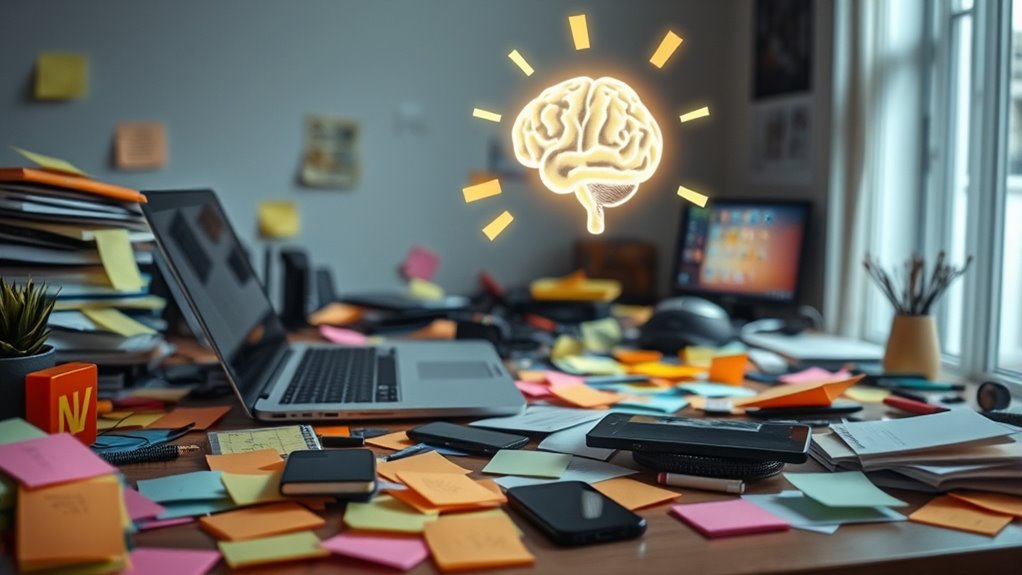Multitasking overwhelms your brain’s limited processing capacity, leading to cognitive overload and fragmented attention. This constant task switching strains neural pathways, reduces focus, and hampers deep engagement with your work. Neuroscience shows your brain is better suited for sequential tasks, so juggling multiple activities lowers productivity and increases mistakes. Focusing on one task at a time enhances neural efficiency and performance. If you’re curious how to boost your focus, there’s more to discover about your brain’s limits.
Key Takeaways
- Multitasking causes cognitive overload, overtaxing working memory and reducing overall productivity.
- Attention fragmentation from multitasking prevents deep engagement and diminishes work quality.
- Neuroscience shows the brain is optimized for sequential rather than simultaneous task processing.
- Constant task switching leads to mental fatigue and impairs focus and information retention.
- Focused, single-task work enhances neural efficiency, learning, and long-term performance.

Multitasking might seem like a way to get more done, but in reality, it often hampers your productivity and focus. When you switch from one task to another rapidly, your brain is forced to constantly reorient itself, which leads to cognitive overload. This overload occurs because your brain has a limited capacity for processing information at any given moment. Instead of smoothly juggling multiple tasks, you’re overloading your working memory, making it harder to retain details or make well-informed decisions. Each switch taxes your mental resources, reducing efficiency and increasing the likelihood of mistakes.
Multitasking overloads your brain, reducing efficiency and increasing mistakes. Focus on one task for better productivity.
Moreover, attention fragmentation is a direct consequence of multitasking. When you try to split your focus, your attention becomes divided into smaller, less effective chunks. Rather than giving your full concentration to one task, your mind hops between activities, preventing deep engagement. This fragmentation causes your attention to become scattered, making it more difficult to enter a state of flow or achieve high-quality results. As a result, the quality of your work drops, and tasks take longer to complete because you’re not fully committed to any one thing at a time.
Research in neuroscience shows that your brain is not designed for multitasking in the way many believe. Instead, it’s better suited for handling sequential tasks. When you attempt to multitask, your brain must constantly switch gears, which is a process called task switching. This process isn’t instantaneous; it involves a brief period of mental recalibration, during which your efficiency diminishes. Over time, this constant switching can lead to mental fatigue and decreased overall productivity. The more you multitask, the more you strain your neural pathways, which hampers your ability to focus deeply and retain information. Recognizing the cognitive limitations of your brain can help you make smarter choices about how you organize your work.
If you want to improve your productivity, the best move is to minimize multitasking. Focus on one task until completion or until you reach a natural break point. This approach allows your brain to fully dedicate its cognitive resources to one activity, reducing cognitive overload and preventing attention fragmentation. By doing so, you’ll find it easier to concentrate, process information more thoroughly, and produce higher-quality work. Overcoming the habit of multitasking rewires your brain to handle tasks more efficiently, leading to better outcomes and less mental exhaustion. Additionally, engaging in focused attention can help strengthen neural pathways associated with concentration. So, instead of juggling multiple tasks at once, give yourself permission to focus fully on one thing at a time—your brain will thank you.
Engaging in focused work also promotes neural efficiency, which is associated with improved learning and performance.
Frequently Asked Questions
How Does Multitasking Affect Long-Term Brain Health?
Multitasking can harm your long-term brain health by reducing neural plasticity, making it harder to learn new skills. Constantly switching tasks may lead to cognitive decline, as your brain struggles to maintain focus and process information efficiently. Over time, this can weaken neural connections, impacting memory and problem-solving abilities. To protect your brain, prioritize single-tasking and give your mind the space to develop and strengthen neural pathways.
Can Multitasking Improve Productivity in Certain Scenarios?
You might think multitasking boosts productivity, but task switching often causes cognitive overload, reducing efficiency. In certain scenarios, like quick, simple tasks, multitasking can help you manage multiple responsibilities. However, for complex or demanding work, focusing on one task at a time is better. By minimizing task switching, you allow your brain to stay engaged and process information effectively, ultimately improving your overall productivity and performance.
What Are the Best Strategies to Reduce Multitasking Habits?
To reduce multitasking habits, focus on improving your focus management and distraction reduction. Start by prioritizing one task at a time, creating a distraction-free environment, and setting specific time blocks for each activity. Turn off notifications and avoid switching tasks frequently. By consciously managing your focus and minimizing distractions, you’ll enhance your productivity and develop healthier work habits, making it easier to concentrate on what truly matters.
Does Multitasking Impact Emotional Well-Being or Stress Levels?
Imagine juggling flaming torches; it’s exciting but risky. Multitasking impacts your emotional well-being by overloading your brain, making emotional regulation harder. It increases stress levels and diminishes your stress resilience, leaving you anxious and overwhelmed. When you focus on one task at a time, you protect your mental health, build better emotional control, and reduce stress. Prioritizing single tasks helps you stay calmer and more emotionally balanced.
Are There Individual Differences in Multitasking Ability?
You might notice that individual differences in multitasking ability stem from cognitive variability and attention span. Some people can switch tasks efficiently, while others struggle to maintain focus. Your attention span influences how well you manage multiple tasks simultaneously, affecting overall performance. Recognizing these differences helps you understand your limits and develop strategies to improve focus, ensuring you work more effectively without overloading your cognitive resources.
Conclusion
So, next time you think about juggling tasks, remember that your brain isn’t a circus performer. Multitasking is like trying to spin plates on a unicycle—eventually, something’s bound to fall. Focus on one thing at a time, and you’ll find your work becomes clearer and more efficient. Just like a clear sky lets you see the stars, single-tasking lets your mind shine and function at its best. Give it a try—you’ll notice the difference.









